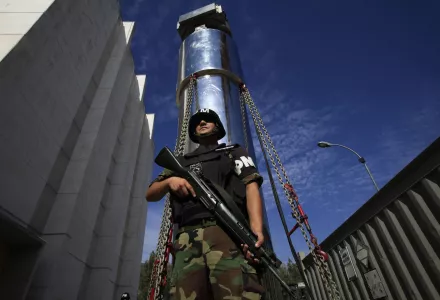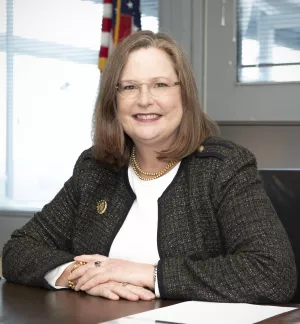
Nuclear weapons in the hands of terrorists can kill millions and wreak the world. This essential truth underpins the enduring, bipartisan U.S. commitment to enhancing the security of nuclear weapons and the materials that can make them.
President Donald Trump sits beside his national security adviser H.R. McMaster as he talks with South Korea's President Moon Jae-In during their summit meeting at the presidential Blue House in Seoul on November 7, 2017. This task has become more multifaceted over time, and the bureaucratic machinery by which the United States pursues these goals has grown in size and complexity. Aligning the legal authorities, available funding, and institutional capacity of more than a dozen departments and agencies involved in policymaking and programmatic implementation for nuclear security is an enduring challenge—one made more difficult in the absence of senior political appointees.
U.S. nuclear security policies are pursued through a variety of avenues, including public and private statements by senior officials in bilateral and multilateral settings; scientific research on threats and the technologies to thwart them; training and capacity building with partners at home and overseas; negotiation of treaties and other international instruments; design and enforcement of national laws and regulations; provision, installation, and maintenance of equipment domestically and abroad; intelligence gathering and analysis; partnerships with related industries and civil society groups; and formal and informal international counterpart relationships at all levels and across all agencies.
Coordination of these myriad actors on a global stage is critical to achieving intended outcomes and to effective use of taxpayer resources. Absent deliberate and accountable coordination at all levels, messages get muddled, money gets wasted, equipment goes unused, gaps go unnoticed, opportunities are missed, and good will is squandered. No one wins awards or makes headlines with this thankless task. Yet without it, U.S. security is at greater risk; and aspiring nuclear terrorists are more likely to acquire the materials, skills, and opportunities to kill millions and inflict economic and political havoc on a global scale.
Effective coordination starts at the White House and engages more than a dozen departments, agencies, and offices. Even the best leadership will struggle with enduring coordination challenges, such as internally aligning programs and policies, working with Congress, liaising effectively with international partners, and facilitating information flow. President Donald Trump’s delays in filling key positions dealing with these matters makes coordination more difficult and reduces U.S. influence in addressing these vital issues internationally.
Holgate, Laura. “The Enduring Challenge of Nuclear Security Coordination.” Arms Control Today, January/February 2018
The full text of this publication is available via Arms Control Today.


